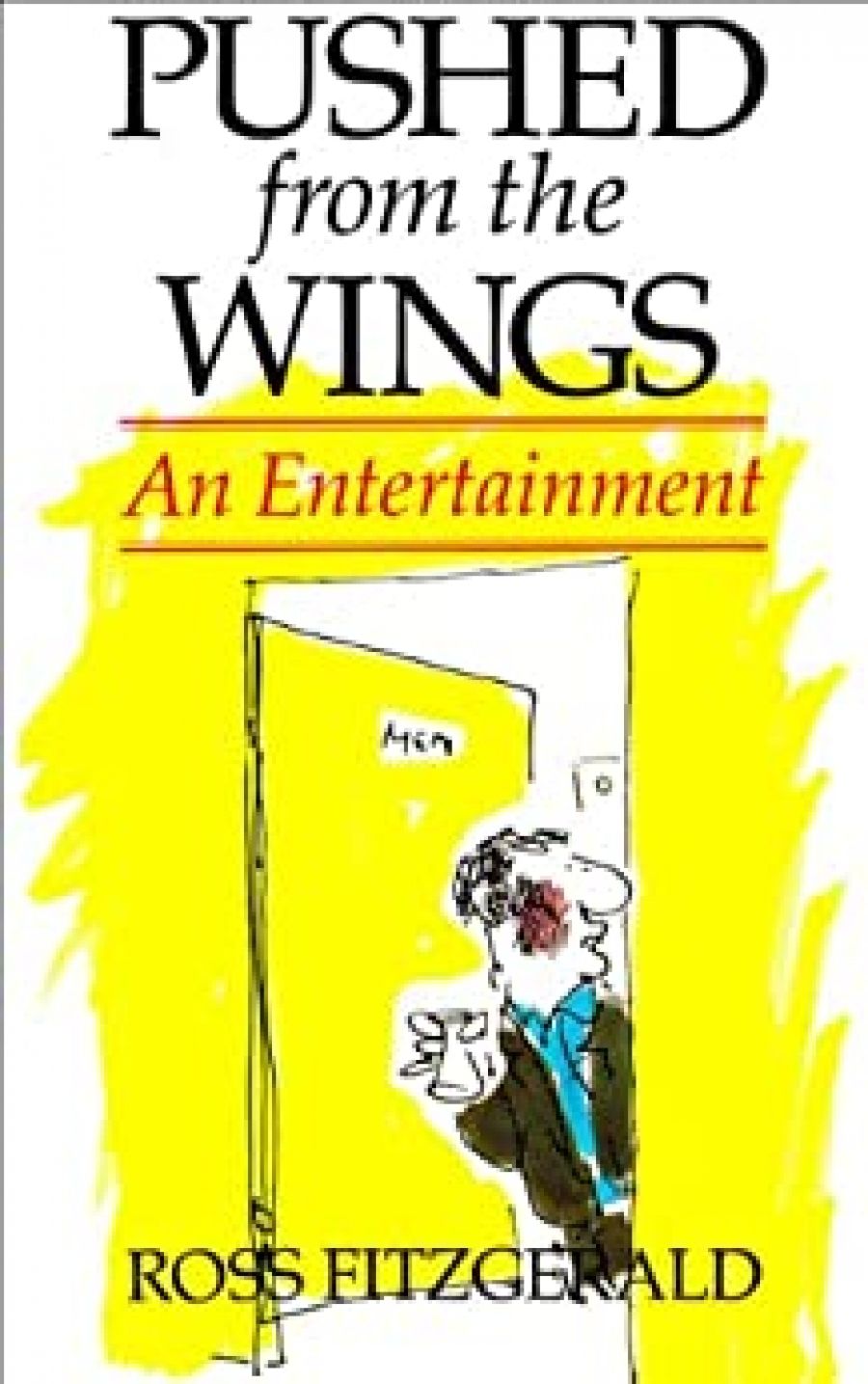
- Free Article: No
- Contents Category: Fiction
- Review Article: Yes
- Article Title: Hanging Out for Tenure
- Article Subtitle: Semioticians, hand grenades and the academic novel
- Online Only: No
- Custom Highlight Text:
By the time I was 35, I’d spent fifteen years as a student and teacher in universities. I was scornful of those who sneered at ‘Sheltered Workshops’ – a fashionable putdown in the early 70s; at the same time, I mocked Zelman Cowan’s observation – when playing stag at bay and asserting that he really was au fait with academia – that ‘I have spent all my adult life in universities’. But they are real places.
- Book 1 Title: Pushed from the Wings
- Book 1 Subtitle: An entertainment
- Book 1 Biblio: Hale & Iremonger 174 pp, $9.95 pb, $19.95 hb
The poor teenage immigrant of romanceless romance I knew that in universities lay all God’s plenty; human variety rich as can be. Here were the fatheaded and the beatific-brained, the kind and the cruel, the Far Right, the Far Left and the Far Out, the really super and the superannuated. The Ivory Tower notion was largely a silly one, I thought then, and think now.
In many ways a university department is a microcosm – albeit a rather overheated one – of the Real World Outside. It has the same ballsups, backbiting, and barbarism as any large office, for instance, though the politics are different. During the early 70s, known to historians and teenage music enthusiasts as The Sixties, there was a big political change. The God Professor disappeared, in the main, and the notion of the tertiary department as a sort of self-governing soviet rapidly evolved. Tertiary departments are now largely run by a democracy of the whole company but that does mean that commitment to any particular policy is difficult; things are normally committeeed. Vox populi, vox diaboli.
The best part of Ross Fitzgerald’s novel Pushed From the Wings is his satire on the bowel movements of the Arts Department in a second-rate (which is not to say fourth-rate) newish University in Queensland. It is better than his plot, which is slim, or than his satire of Queensland politics, which is heavy-handed. The only review I’ve seen of the novel in a Queensland publication suggested that the author apply a vacuum cleaner to his ears: the thing was disgusting and foul-minded beyond reason.
But it isn’t. It’s a curate’s egg of a book, but the parts that are funny are very funny (if you’re not put off by the first few lines, that is) and the four-letter-worded dialogue not much exaggerated from common speech.
The novel is subtitled ‘An Entertainment’, presumably along the lines of Graham Greene’s distinction between his ‘real’ novels and the others. It is also a roman à clef. Many of the characters are identifiable under their fictional names though of course – as the lawyers would point out – they remain entirely fictional and any resemblance to ... I bet you know who this woman is, for instance:
... Tottie McKramp was not appreciably the worse for wear after her return stint at the ABC ... ‘I believe in the absolute importance of Excellence in every sphere of life ... I was rewarded. When asked to serve, I always served as a person not a woman. I have always tried to get things right ... I’ve always done my homework.’
The novel concerns a few weeks in the life of Dr Grafton Everest, a lecturer hanging out for tenure at Bowen University somewhere in the near future. He gets it in return for joining a rightwing terrorist plot to bugger the Left and denigrate (!) land rights agitation. Organised from his old school – a sort of antipodean Eton – they attempt blackmail with a homemade nuclear device. The leader, a former teacher of Everest’s, is a delicious portrait of that universal human type, the Gestapo officer. The novel’s climax – which takes place in the presence of King Charles and Queen Diana, Prime Minister Blainey and Queensland Premier Boss Hogan – is, literally, a riot.
The hero is a marvellous creation. Grafton Everest would be an object of pity if he didn’t supply so much of it for himself. Vast, mother-dominated, impotent and hypochondriac, he is ministered to by his long-suffering wife with more than saintly patience. He resembles Falstaff and Sir Les Patterson; he is an object of fascinated disgust. Sic transit gloria universitatis.
The plot isn’t much, but it’s worth reading for the waddling career of its monstrous protagonist, for the hilarious goings-on in tertiary-level politicking, and for some very good jokes – as well as for lovely evocative lines like this: ‘A semiotician, holding a hand grenade, stood alone.’


Comments powered by CComment